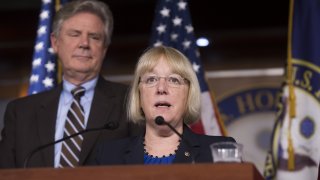
- Democratic Sen. Patty Murray and Rep. Frank Pallone aim to write a bill to create a health-care public option.
- President Joe Biden ran on expanding the public insurance market, but has not included the measure in his economic recovery plans.
- As Republicans have opposed efforts to expand government-managed health care, Democrats would likely have to put a public option in a budget reconciliation bill that could pass without GOP votes.
Two key Democrats plan to write a bill to create a public health-care option, a move they hope will expand insurance coverage and cut costs.
Senate Health, Education, Labor and Pensions Committee Chair Patty Murray, D-Wash., and House Energy and Commerce Committee Chair Frank Pallone, D-N.J., asked Wednesday for public input on how to craft "a federally administered public option that provides quality, affordable health coverage throughout the United States."
The lawmakers, who oversee panels with jurisdiction over health-care policy, looked for feedback on who should be eligible for plans, what benefits they should offer and what role states should have in administering them, among other issues.
Get New England news, weather forecasts and entertainment stories to your inbox. Sign up for NECN newsletters.
Murray and Pallone set out to draft insurance legislation as President Joe Biden excludes a public option from his economic recovery proposals. Biden ran for president on creating a Medicare-like plan many Americans could buy into, but has opted for now to boost access to plans offered under the Affordable Care Act.
The White House did not immediately return a request for comment on the Murray-Pallone plan.
Some Democrats have urged the president to include a public option or lower the Medicare eligibility age as part of his American Families Plan. Democrats would likely have to pass the proposal, the second piece of Biden's recovery agenda, without Republican votes using special budget rules.
Money Report
The GOP has fought against expansions of government-run insurance. If Democrats decide to pursue a public option, they could face additional resistance from the health-care industry — or from within their own party, depending on how the bill is structured.
About two-thirds of voters, or 68%, support a public option, a Kaiser Family Foundation poll found in March. The share includes 56% of Republicans.
The question of how best to expand health coverage emerged as a core issue in the 2020 Democratic presidential primary, even before the coronavirus pandemic made millions of Americans lose their employer-sponsored insurance.
Biden's plan to create a public option differed from the single-payer "Medicare for All" system offered by his leading challenger for the nomination, independent Sen. Bernie Sanders of Vermont.
Biden has taken steps to address health-care coverage and costs since he took office. His administration opened a special enrollment period for Obamacare insurance plans, during which at least 1 million people have signed up.
The coronavirus relief package Biden signed into law in March included an expansion of subsidies for people buying insurance on the ACA marketplace. The American Families Plan calls to put $200 billion into making those measures permanent.
However, Biden has not moved as president to put a public option in place. In their letter seeking input, Murray and Pallone said too many Americans lack access to coverage despite the White House's efforts.
"While the Biden Administration has taken a number of steps to expand coverage, including opening a special enrollment period that enabled over one million people to sign up for coverage on the Federal Marketplace alone, tens of millions of American still remain uninsured or underinsured," the lawmakers wrote.
Sens. Michael Bennet, D-Colo., and Tim Kaine, D-Va., wanted Biden to include their Medicare public option plan in a budget reconciliation bill this year.
Senators including Sanders also pushed Biden to lower the Medicare eligibility age to 55 or 60, from the current 65, as part of his recovery plans. They said he could fund the coverage expansion by allowing Medicare to directly negotiate prices with drug companies.
Biden did not include the negotiating proposal in his families plan. During his first joint address to Congress, he urged lawmakers to pass legislation allowing direct negotiations.






